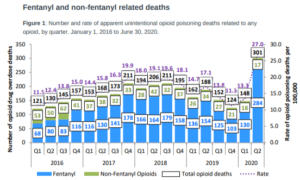We Canadians may like to think of ourselves as more progressive than our southern neighbours when it comes to drug policy. Truth is, we’re only ever one election away from regression and fear-mongering based on stigma, racism and a refusal to acknowledge the evidence behind harm reduction.
Although Health Canada has reiterated current federal support for safe consumption sites (SCS) and endorsed programs providing a safe supply of drugs, each province and territory is ultimately in control of its own healthcare. This leaves harm reduction services in a precarious position.
Nowhere has this been more shamefully illustrated than in Alberta, where the provincial government forced North America’s busiest SCS to shut down on August 31, of all days: International Overdose Awareness Day.
The stakes of such a decision are made starkly clear by Alberta’s latest overdose figures. Released on September 23, they cover the period from April 1 to June 30, which saw 301 deaths in the province—almost double that of the same quarter last year. On average, 2.5 Albertans died each day from opioid-involved overdose in the first six months of 2020. The graph below shows the recent record surge.
 Source: Government of Alberta
Source: Government of Alberta
April 2019’s provincial election handed power to Alberta’s United Conservative Party (UCP). The party’s leader, Premier Jason Kenney, has a history of dismissing harm reduction in the most stigmatizing terms. In 2018 he claimed that SCS “Help addicts inject poison into their bodies,” and that they are “not a solution to the problem of addiction.”
The entire UCP has followed Kenney’s lead and constantly challenges harm reduction in ways that can sway public opinion. In an attempt to discredit the mountain of evidence showing that SCS save and improve lives, Jason Luan, the associate minister for mental health and addictions, also suggested that pharmaceutical companies fund harm reduction research—a claim that a research scientist dismissed as “laughably absurd.”
Alberta is a western province with a population of 4.4 million. Conservatives have held power there for 45 of the last 49 years. But under the Alberta New Democratic Party (NDP), which formed the government from 2015-2019, the province saw the rapid scale-up of harm reduction and treatment measures to address the overdose crisis. These measures included recommendations for operational funding and evaluation of SCS, expansion of the take-home naloxone program, and increased funding for Indigenous communities.
The UCP accused the NDP of placing too much emphasis on harm reduction, and touted a need to focus on developing an abstinence-based “recovery-oriented system of care,” branded “the Alberta Model.”
Upon taking power, the UCP convened a panel—including no harm reduction or public health experts—to review the socioeconomic impacts of SCS on communities. In March, the panel duly produced a report that was deeply flawed but nevertheless ended planned SCS projects across the province.
Then in July, the UCP pulled provincial funding from the safe consumption site ARCHES, citing fund mismanagement. Without the money to continue, the facility closed its doors on August 31.
ARCHES, or the AIDS Outreach Community Harm Reduction Education Support Society, was located in Lethbridge—a small, conservative city with a large Indigenous population in what might be called the “bible belt” of Alberta.
Opened in March 2018, ARCHES averaged over 500 visits per day, which speaks volumes for its importance. It offered North America’s first sanctioned safe inhalation site, in addition to services such as syringe distribution, outreach, take-home naloxone kits and chill-out space.
Regardless of the merit of the allegations of misused funds, there had to be another way. The UCP’s action will inflict myriad harms on vulnerable people who use drugs—people who already face marginalization and structural barriers to accessing healthcare services. The timing of this closure, when drug users face greater dangers than ever before, could not be more outrageous.
The office of Associate Minister Luan did not respond to Filter’s requests for comment about the closure of ARCHES by publication time.
“The UCP is communicating that the value of people who use drugs is negotiable.”
Tim Slaney, who previously worked for ARCHES as an outreach and harm reduction specialist, criticized the UCP’s blatant disregard for the lives and wellbeing of people who use drugs, telling Filter that the government’s rationale points to a “lack of respect for the value of consumption services.”
He noted that the UCP “appeared to show no interest” in finding alternative ways to address the allegations of fund mismanagement, and instead simply “began signalling to the media that the response would be closure.”
The closure has already led to negative consequences. The Lethbridge Sage Clan Patrol, a community-based outreach organization, has noticed increased overdoses and needle debris since the closure. There is no doubt that for any other cause of death, an immediate response would be prioritized.
“It’s [drug use] just spread out in the city now… [that’s] what the closing of the site has done. It was centralized before,” Sage Clan Patrol leader Mark Brave Rock told Global News.
Alberta Health Services will now instead operate a mobile SCS, with a far smaller capacity than ARCHES and strings attached—a move that’s being condemned by the harm reduction community.
“By replacing the SCS with [a mobile unit] that has less than 10 percent of the client capacity, and predicating [its] continued operation … on favourable treatment uptake figures, the UCP is communicating [that] the value of people who use drugs is negotiable,” said Slaney.
This has happened while numbers of overdose deaths are hitting record highs around the country amid the pandemic. Neighbouring British Columbia saw 175 deaths in July of this year—an increase of 136 percent compared with July 2019. The new Alberta figures show that the impact of the pandemic on the overdose crisis here, too, has been devastating.
“If we lose the sites, the death rate will go up.”
Katrina Milaney, an associate professor at the University of Calgary, led a research project involving 800 people who use drugs in Alberta to better understand their drug-use patterns, health issues, and experiences accessing healthcare, including SCS.
She was blunt about the impact closing ARCHES will have on this population. “Currently, people who are using SCS are not dying from an overdose at those sites,” she told Filter. “If we lose the sites, the death rate will go up.”
“Those sites are also often the first point of contact many people have with healthcare staff,” she added. “Part of what they do is offer referrals to housing programs, treatment programs and community healthcare.”
The ARCHES decision is one of several that the UCP government has taken at the expense of harm reduction.
In March, for example, it decided not to renew a grant dedicated to a pilot of injectable opioid agonist therapy—an evidence-based treatment providing liquid hydromorphone to people for whom other medications for opioid use disorder, like buprenorphine and methadone, haven’t worked. That decision was unethical and devastating for impacted patients, according to physicians in the province.
An open letter signed by over 600 community members was sent to Premier Jason Kenney, warning him about the increased deaths that would result from defunding that pilot—and from his overall disregard for harm reduction.
Milaney warned that in this climate, other SCS in Alberta should now be concerned about potential closure. “The UCP has been very clear that they do not believe in harm reduction—they believe in abstinence-based responses only,” she said. “They have repeatedly called the sites ‘NDP drug sites,’ which is a false representation. If you believe there is only one solution to a complex issue like addiction, then you do not understand addiction.”
Milaney added that the government’s failure to accelerate or supplement its quarterly overdose reporting during the pandemic—the situation that saw Alberta’s figures for April through June only being made available now—reflects its deprioritization of this issue.
The community response to the ARCHES closure has been concerted. Over 800 community organizations and individuals across the country signed a letter addressed to the relevant UCP government officials, denouncing their decision and requesting that it be reversed. On August 31, over 100 Lethbridge residents held a “die-in” protest, calling on the government to restore funding to ARCHES.

These are the people for whom harm reduction is not just a political talking point, or a budget line that can be carelessly cut to support a politician’s antiquated views about addiction as a moral failing.
People who use drugs and their communities will continue to fight for loved ones, peers and everyone who uses drugs. Their lives should not be dependent on callous political whims.
Photographs from ARCHES courtesy of Time Slaney





